
ai-driven-dev-community
A collection of tools, prompts, snippets and agents for developers that use AI, daily.
Stars: 69
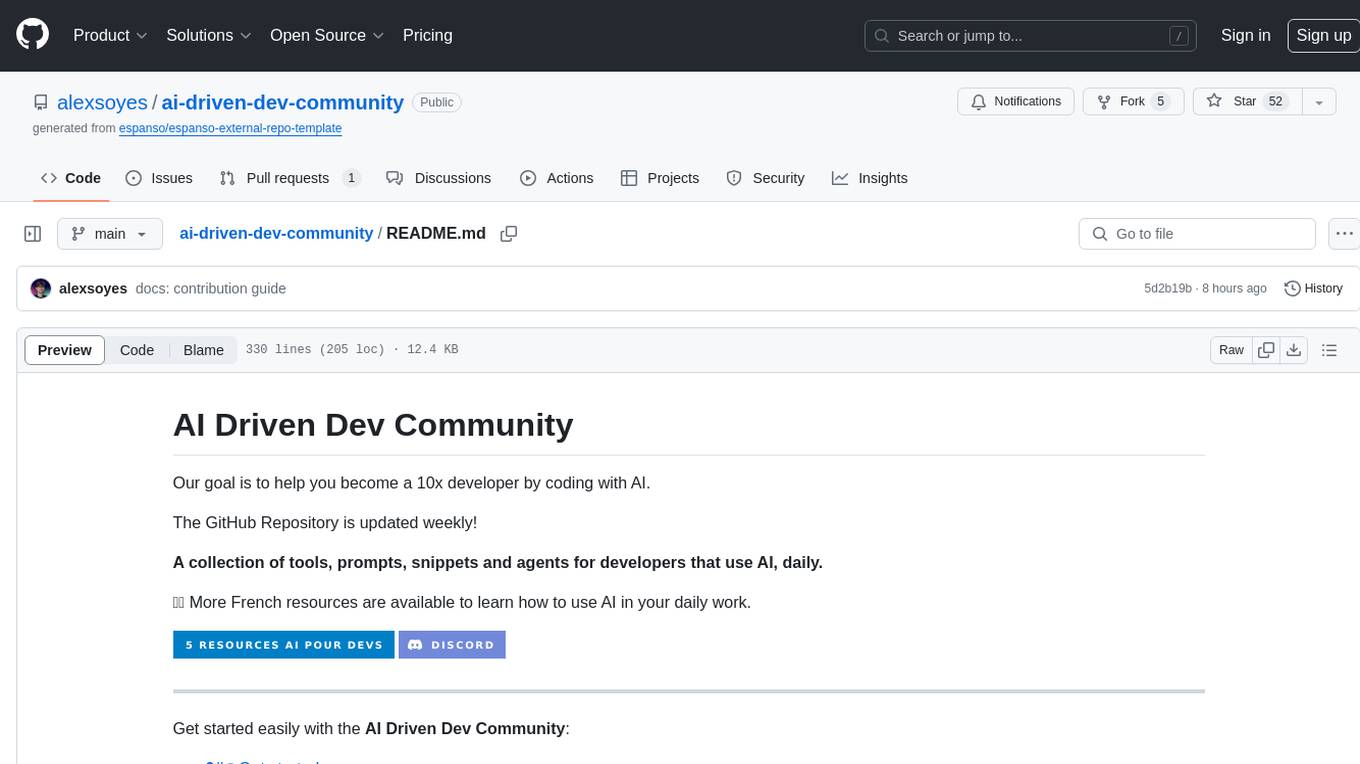
AI Driven Dev Community is a repository aimed at helping developers become more efficient by utilizing AI tools in their daily coding tasks. It provides a collection of tools, prompts, snippets, and agents for developers to integrate AI into their workflow. The repository is regularly updated with new resources and focuses on best practices for using AI in development work. Users can find tools like Espanso, ChatGPT, GitHub Copilot, and VSCode recommended for enhancing their coding experience. Additionally, the repository offers guidance on customizing AI for developers, installing AI toolbox for software engineers, and contributing to the community through easy steps.
README:
Our goal is to help you become a 10x developer by coding with AI.
The GitHub Repository is updated weekly!
A collection of tools, prompts, snippets and agents for developers that use AI, daily.
🇫🇷 More French resources are available to learn how to use AI in your daily work.
Get started easily with the AI Driven Dev Community:
- AI Driven Dev Community
This repository is made to be easily updated by just editing the Readmes!
This is our best practices to use AI in your daily dev work:
- Use AI for repetitive tasks - Yes, AI can be sometimes slower or mistaken, but in the long run, it will save you time.
- Adopt at least 2 AI in your daily work - One for coding, one for instructions.
- Pin ChatGPT or equivalent in your browser - Or just install the desktop app to always have it available.
- Enforce daily AI code generation - Use snippets, prompts, and instructions to make it a habit, EVERY-DAY.
- Open AI Chat in your IDE - Use a plugin to have it available in your IDE.
- Check all the prompts available - Use them, change them, embrase them the more you can.
If you do follow these best practices, you will become a 10x Dev in no time.
- Espanso - Text expander to use the prompts in your daily work. (Required * for the prompts)
- ChatGPT - AI to help you in your daily work. (Recommended)
- GitHub Copilot - AI to help you code faster. (Recommended)
- Maccy - OSX Clipboard manager to use the prompts easily. (Recommended)
- VSCode - Because Copilot AI features are available sooner in this IDE. (Recommended)
Free and Paid alternatives are available for each tool.
Here is a basic workflow of how you can combine prompts, parameters and AI instructions.
Custom instructions to transform an AI like ChatGPT into a RAG, now it became a member of your team that knows about the specs and the codebase.
Teach an AI to act as a Dev... from your own team
"Fine-tune" the LLM using a RAG to act as a developer in your project.
This will help you to get the best out of the AI by providing it with the right context and knowledge about your project.
- Documents list to provide - Upload the relevant documents to instruct the AI about your project.
- Create a RAG for your project - Instructions for AI to act as a developer from your team, using your language etc.
Personalize the AI to have better performance and quicker answers.
This will help you to get the best out of the AI by providing it with the right context and knowledge about your project.
Use those GPT agents to help you in your daily work.
(Include instructions sources)
This repo is filled of amazing prompt for developers, mapped with my favorite text expander, Espanso. Use the prompts in your daily work:
- Use a keyboard shortcut (like
:codeHelpMeThinking) - Or by using the dialog box (
⌥ + SPACEorALT + SPACE)
Basically, all prompts in the repository are available as an Espanso package.
This make it easy for every developer to use the prompts in their daily work.
Guide:
-
Follow the Espanso installation guide here for your operating system.
-
Then, install the package:
espanso install ai-driven-dev-prompts --git [email protected]:alexsoyes/ai-driven-dev-community.git --external- Configure the package from config directory:
From "espanso path config/default.yml":
# prevent "v" being pasted instead of the prompt
backend: "inject"
# allow to keep current prompt in clipboard
preserve_clipboard: false
# reload when config / package changes
auto_restart: true
# delay to paste the prompt
clipboard_threshold: 100🔄 Note: Update every time you want to get the latest prompts:
espanso package update ai-driven-dev-promptsHere are the best prompts to use in your IDE... Sorted!
Those prompts have been selected AND tested to help you in your daily work.
Feel free to use them and add your own! ❤️ (credit your own prompts)
- 🐛 Bug Fixing (in progress)
- 🕵️♀️ Code Review (in progress)
- 💻 Code Writing
- 📚 Documentation
- 🛠️ General Dev - Help to use AI in our daily work (but not specifically AI oriented).
- ♻️ Refactoring (in progress)
- 🧪 Testing
More dev prompts:
- Language Specific
- Private prompts
Sometimes you need a bigger context to get the best out of your AI.
Use those dev prompts (mostly in ChatGPT or equivalent):
Use the CLI to code with the AI when you need to write in multiple files at once.
AI is able to make good and clean code reviews for you, automaticly bound to your commit deployments.
Clone this repo: git clone [email protected]:alexsoyes/ai-driven-dev-community.git
You are all set!
Requirements:
- Node.js - To run the project.
A set of scripts for developers that directly communicate with OpenAI's ChatGPT API.
Full documentation available in the scripts directory.
Available aliases:
-
aiddc-changes: List the changes in the repository. -
aiddc-changes-from-main: List the changes in the repository from the main branch. -
aiddc-commit-last: Get the last commit message. -
aiddc-commit-msg: Generate a commit message (using AI).
curl -sSf https://raw.githubusercontent.com/alexsoyes/ai-driven-dev-community/main/scripts/aiddc/install.sh | bashA python scraper to save HTML / Markdown content from your best websites.
Full documentation available in the scraper directory.
Requirements:
- Python 3+ - To run the scraper.
Having your personal prompts in a huge Notion doc or shared with your team?
You can easily make them available privately in your computer with Espanso.
- Add your prompts in
markdownin the directory./prompts/private/ - Take a look at the contributing guide to create a perfect prompt.
- Start the project:
npm i && npm start
Enjoy your private prompts!
We created a list of snippets we daily use as a frontend TypeScript developer.
AI makes way much easier code generation.
But sometimes, when you exactly know what you need, you do not necessary need a Gen-AI to write obvious code for you.
Thus, AI can be mistaken, as a developer, you are the master of your code structure.
Feel free to use them!
Languages:
Libraries:
Installation:
You can install them easily with the following script:
#!/bin/bash
# TODO: add OS support
# TODO: merge with existing files
PATH_SOURCE=$(pwd)/vscode
PATH_DESTINATION=~/Library/Application\ Support/Code/User/snippets
# Check if both source and destination exist
if [ ! -d "${PATH_SOURCE}" ]; then
echo "Source directory does not exist: ${PATH_SOURCE}"
exit 1
fi
if [ ! -d "${PATH_DESTINATION}" ]; then
echo "Destination directory does not exist: ${PATH_DESTINATION}"
exit 1
fi
# For each file in source, copy it in the destination, but if exists, rename it with a .bak extension and current date
for file in "${PATH_SOURCE}"/*; do
filename=$(basename $file)
if [ -f "${PATH_DESTINATION}/$filename" ]; then
mv "${PATH_DESTINATION}/$filename" "${PATH_DESTINATION}/$filename.bak.$(date +%Y%m%d)"
fi
cp -v "${PATH_SOURCE}/${filename}" "${PATH_DESTINATION}/${filename}"
done
# source: scripts/generated/snippets-install-osx.shWe are a group of french software engineers that are using AI in our daily work.
Motivated to use AI in your daily developer work life?
Join us on Discord to get the latest updates, news and shared experiences with AI.
French courses are available to learn how to use AI in your daily work.
Various links available that do not fit in other categories:
External:
- Anthropic Prompt Library - A collection of prompts to use with Claude.
- LLMLingua - Prompts compressing for accelerated inference.
- GitHub: "Awesome Agents" - A curated list of AI agents to use in your daily work.
- GitHub: Copilot course from Microsoft - Mastering GitHub Copilot for Paired Programming.
Internal:
- GPTs source list for developers 📋 (Include prompt source when available)
- Various - Various and personals prompts that do not fit in other categories.
Check the Demo on YouTube to learn how to use our repository!
This repository is made to be easily updated by just editing the Readmes!
It will automatically update the prompts and the scripts.
If only one person updates one Readme, the whole community will benefit from it.
- Fork the repository, then clone it.
- After installation, run
npm i && npx husky-initif you want to automatically: - Update any Readme from sub-directories in
./resourcesto automatically generate the prompts in Espanso and scripts generation! - Check the Contributing guide
- Push your changes and create a Pull Request.
You can also contribute without forking the repository:
Report prompting issues / improvements at [email protected]
For Tasks:
Click tags to check more tools for each tasksFor Jobs:
Alternative AI tools for ai-driven-dev-community
Similar Open Source Tools

ai-driven-dev-community
AI Driven Dev Community is a repository aimed at helping developers become more efficient by utilizing AI tools in their daily coding tasks. It provides a collection of tools, prompts, snippets, and agents for developers to integrate AI into their workflow. The repository is regularly updated with new resources and focuses on best practices for using AI in development work. Users can find tools like Espanso, ChatGPT, GitHub Copilot, and VSCode recommended for enhancing their coding experience. Additionally, the repository offers guidance on customizing AI for developers, installing AI toolbox for software engineers, and contributing to the community through easy steps.
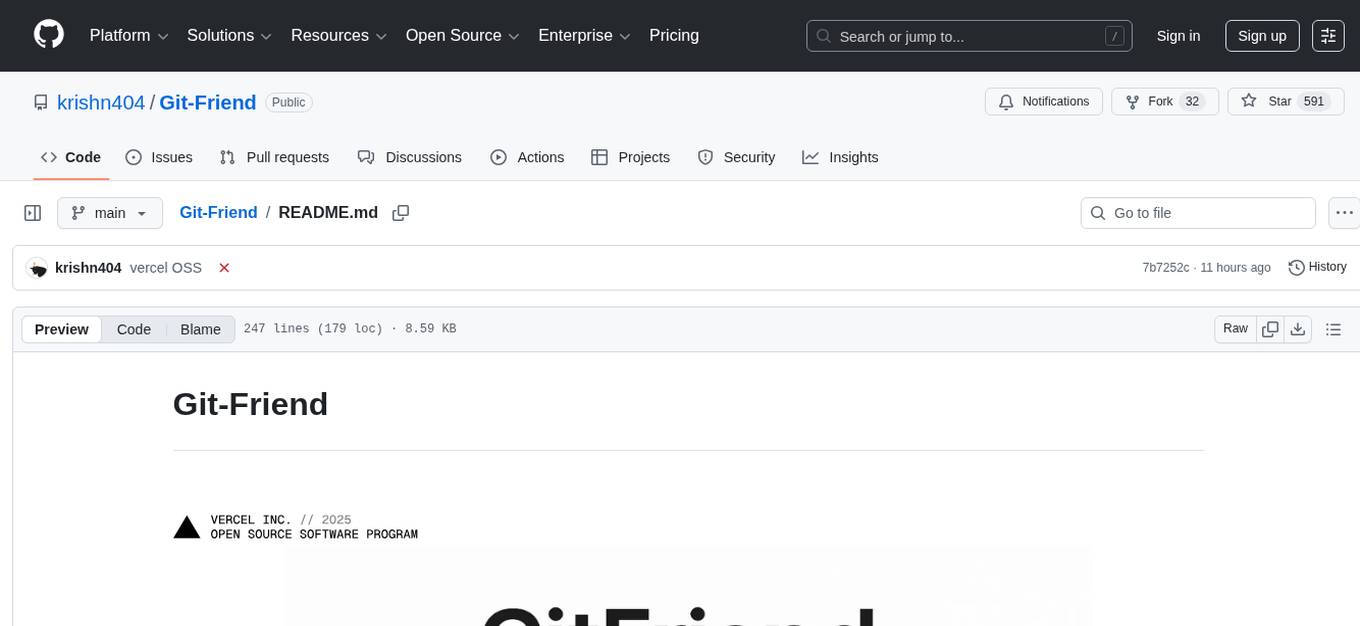
Git-Friend
GitFriend is an AI-powered GitHub assistant tool designed to enhance your GitHub experience by offering features like AI Chat for GitHub Help, Dynamic README Generation, and Commit Emojis. It simplifies GitHub workflows, saves time, and improves productivity for developers, project managers, and beginners. The tool is built with React, TypeScript, and AI technology, providing a user-friendly interface and various powerful tools to streamline repository management.

plandex
Plandex is an open source, terminal-based AI coding engine designed for complex tasks. It uses long-running agents to break up large tasks into smaller subtasks, helping users work through backlogs, navigate unfamiliar technologies, and save time on repetitive tasks. Plandex supports various AI models, including OpenAI, Anthropic Claude, Google Gemini, and more. It allows users to manage context efficiently in the terminal, experiment with different approaches using branches, and review changes before applying them. The tool is platform-independent and runs from a single binary with no dependencies.
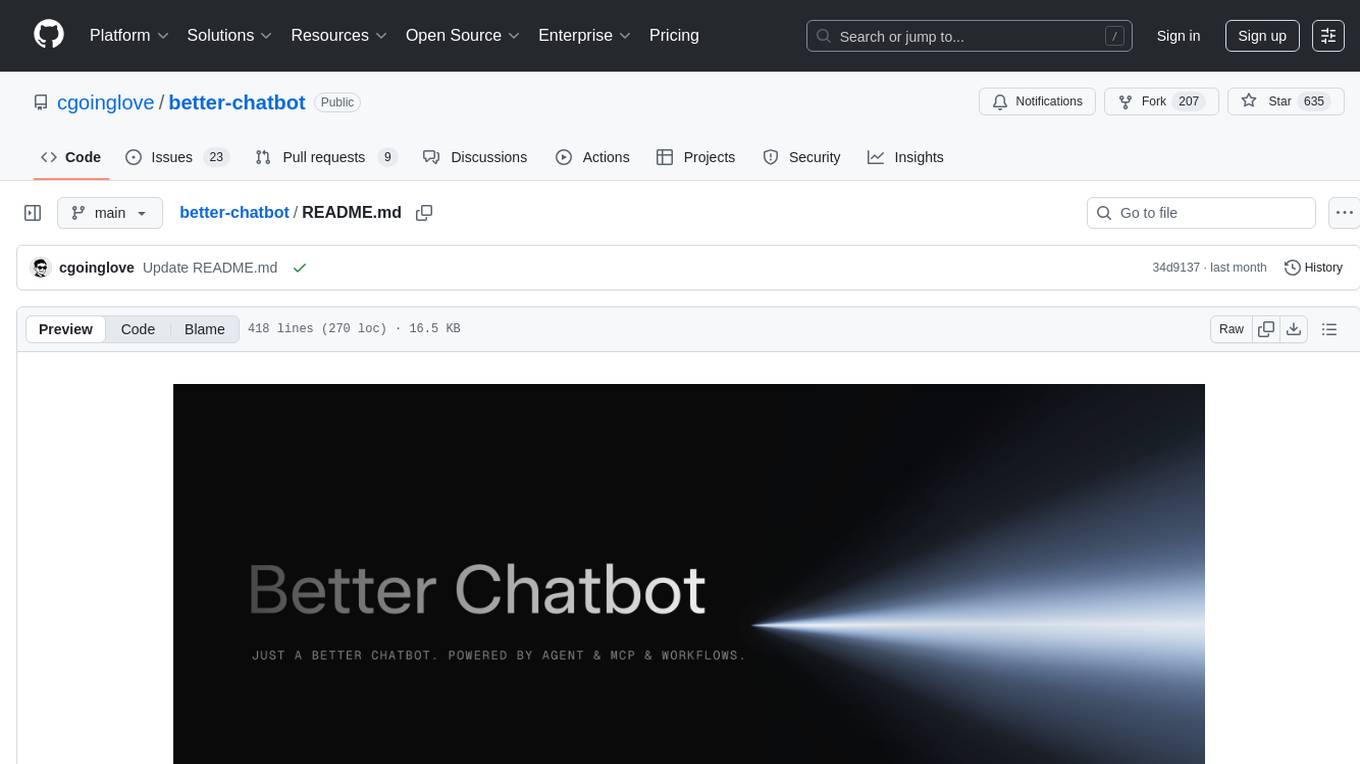
better-chatbot
Better Chatbot is an open-source AI chatbot designed for individuals and teams, inspired by various AI models. It integrates major LLMs, offers powerful tools like MCP protocol and data visualization, supports automation with custom agents and visual workflows, enables collaboration by sharing configurations, provides a voice assistant feature, and ensures an intuitive user experience. The platform is built with Vercel AI SDK and Next.js, combining leading AI services into one platform for enhanced chatbot capabilities.

DevoxxGenieIDEAPlugin
Devoxx Genie is a Java-based IntelliJ IDEA plugin that integrates with local and cloud-based LLM providers to aid in reviewing, testing, and explaining project code. It supports features like code highlighting, chat conversations, and adding files/code snippets to context. Users can modify REST endpoints and LLM parameters in settings, including support for cloud-based LLMs. The plugin requires IntelliJ version 2023.3.4 and JDK 17. Building and publishing the plugin is done using Gradle tasks. Users can select an LLM provider, choose code, and use commands like review, explain, or generate unit tests for code analysis.
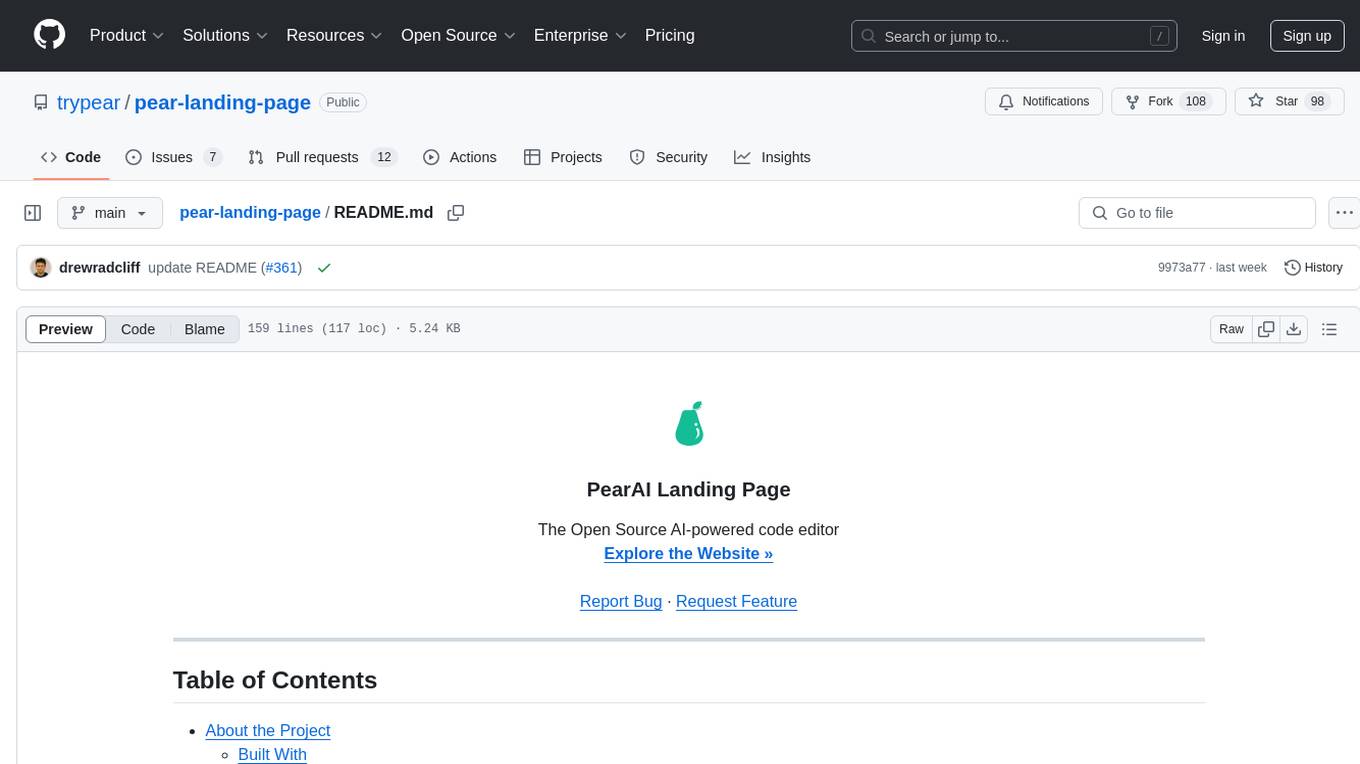
pear-landing-page
PearAI Landing Page is an open-source AI-powered code editor managed by Nang and Pan. It is built with Next.js, Vercel, Tailwind CSS, and TypeScript. The project requires setting up environment variables for proper configuration. Users can run the project locally by starting the development server and visiting the specified URL in the browser. Recommended extensions include Prettier, ESLint, and JavaScript and TypeScript Nightly. Contributions to the project are welcomed and appreciated.
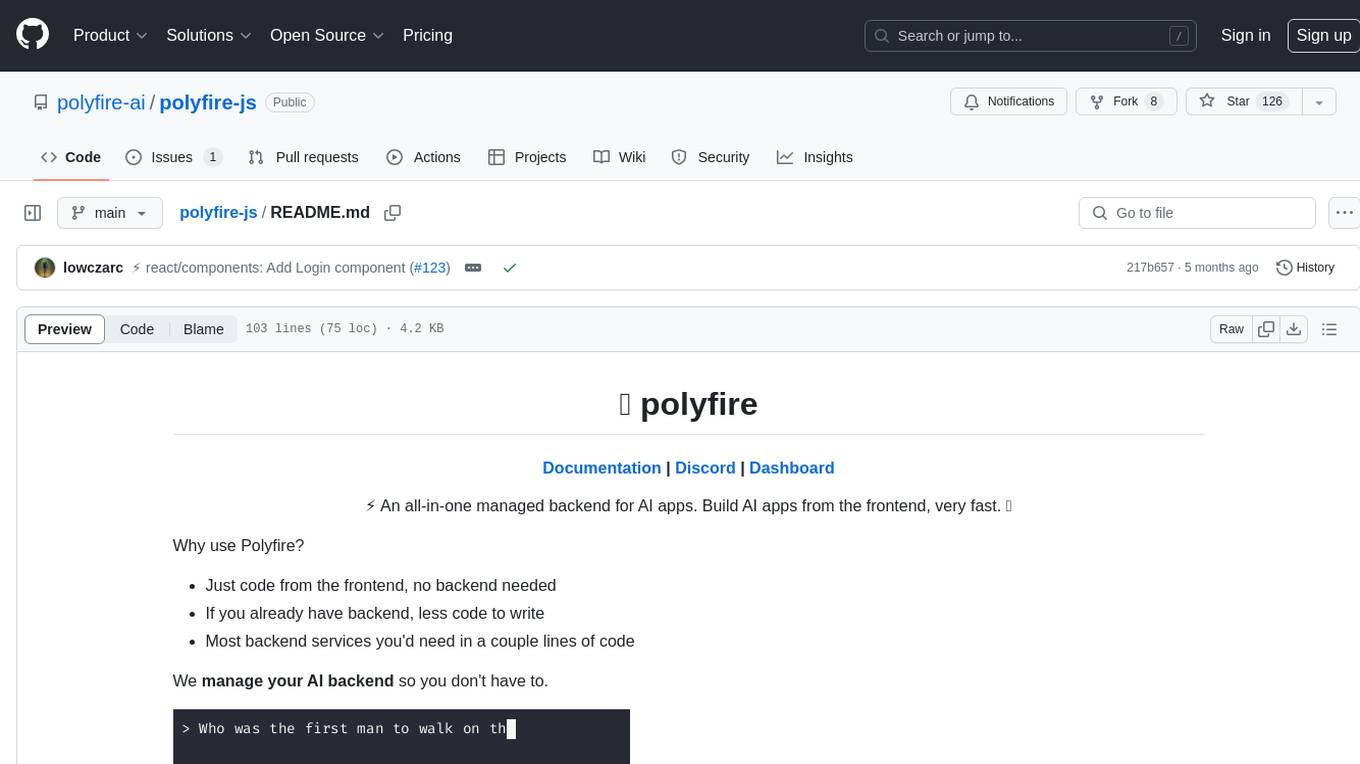
polyfire-js
Polyfire is an all-in-one managed backend for AI apps that allows users to build AI applications directly from the frontend, eliminating the need for a separate backend. It simplifies the process by providing most backend services in just a few lines of code. With Polyfire, users can easily create chatbots, transcribe audio files, generate simple text, manage long-term memory, and generate images. The tool also offers starter guides and tutorials to help users get started quickly and efficiently.
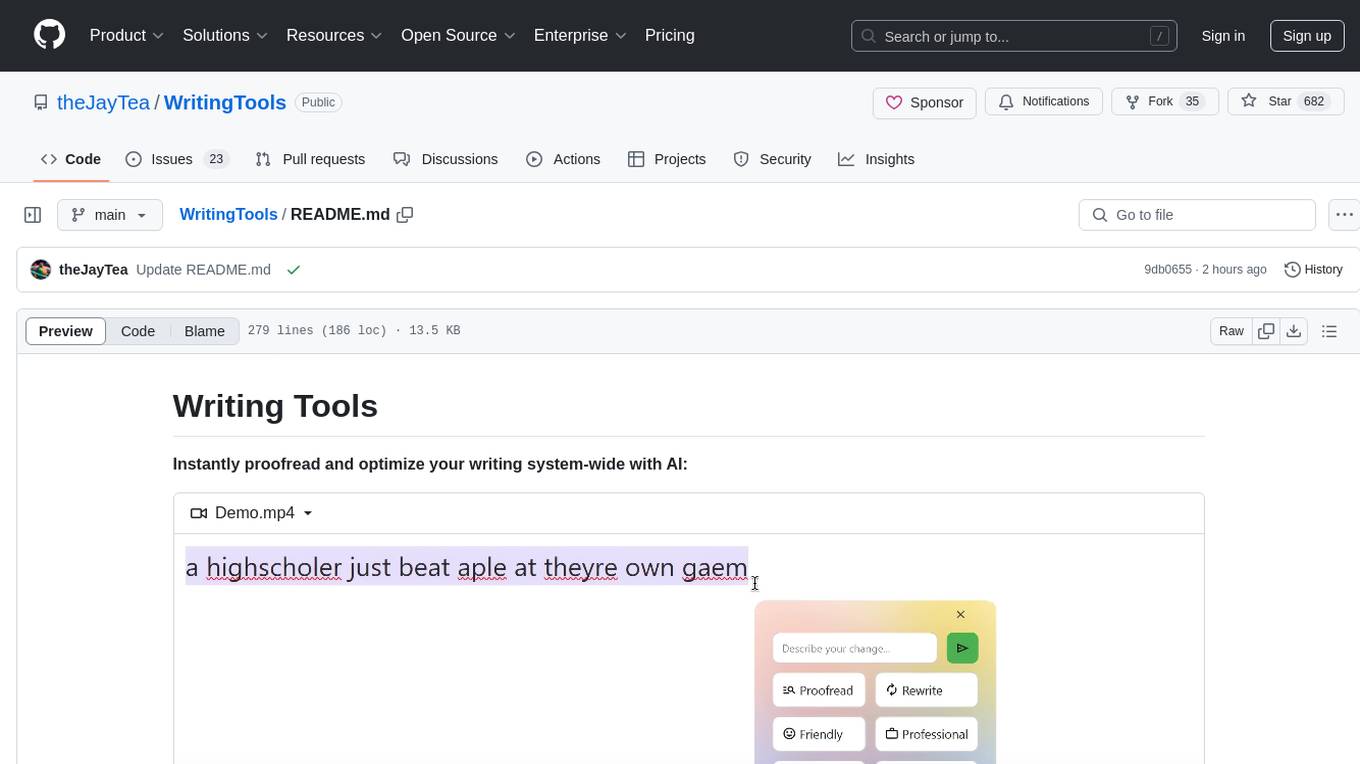
WritingTools
Writing Tools is an Apple Intelligence-inspired application for Windows, Linux, and macOS that supercharges your writing with an AI LLM. It allows users to instantly proofread, optimize text, and summarize content from webpages, YouTube videos, documents, etc. The tool is privacy-focused, open-source, and supports multiple languages. It offers powerful features like grammar correction, content summarization, and LLM chat mode, making it a versatile writing assistant for various tasks.

llm-answer-engine
This repository contains the code and instructions needed to build a sophisticated answer engine that leverages the capabilities of Groq, Mistral AI's Mixtral, Langchain.JS, Brave Search, Serper API, and OpenAI. Designed to efficiently return sources, answers, images, videos, and follow-up questions based on user queries, this project is an ideal starting point for developers interested in natural language processing and search technologies.
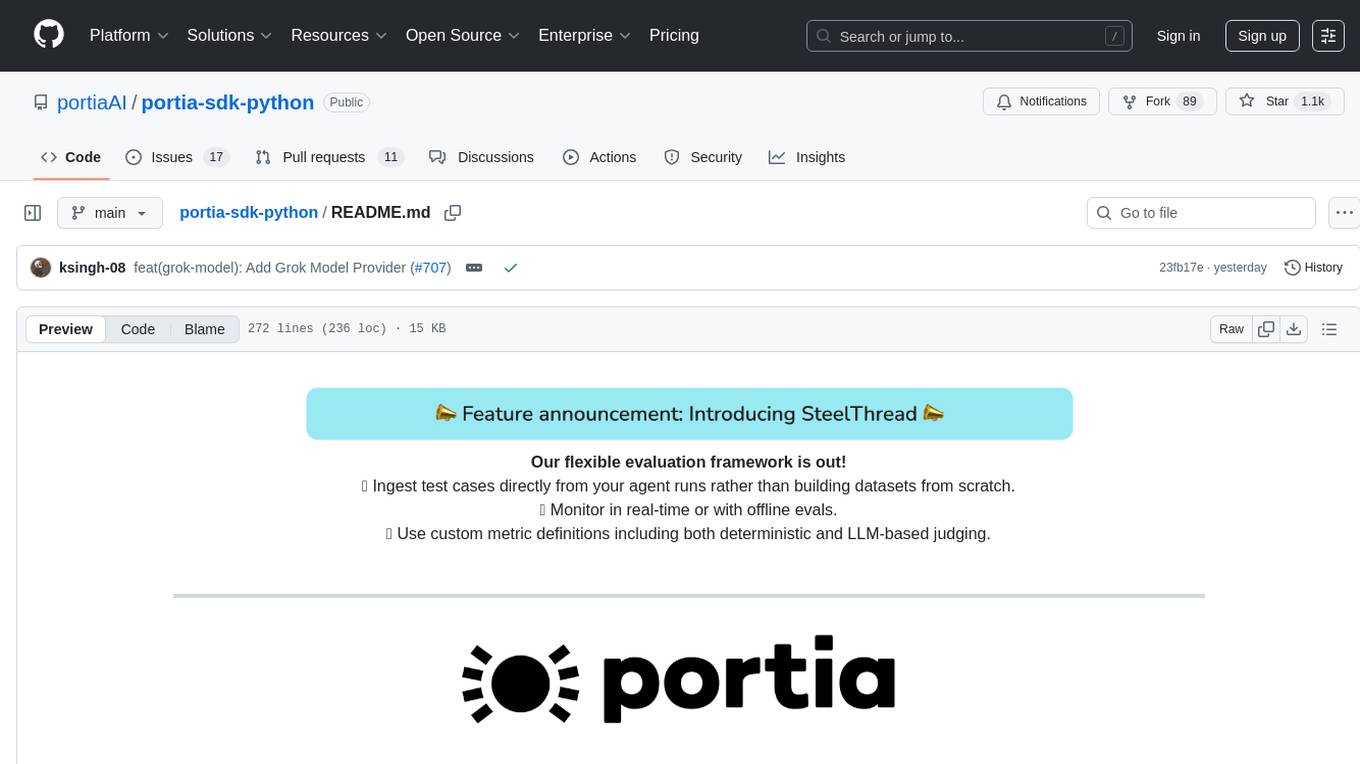
portia-sdk-python
Portia AI is an open source developer framework for predictable, stateful, authenticated agentic workflows. It allows developers to have oversight over their multi-agent deployments and focuses on production readiness. The framework supports iterating on agents' reasoning, extensive tool support including MCP support, authentication for API and web agents, and is production-ready with features like attribute multi-agent runs, large inputs and outputs storage, and connecting any LLM. Portia AI aims to provide a flexible and reliable platform for developing AI agents with tools, authentication, and smart control.
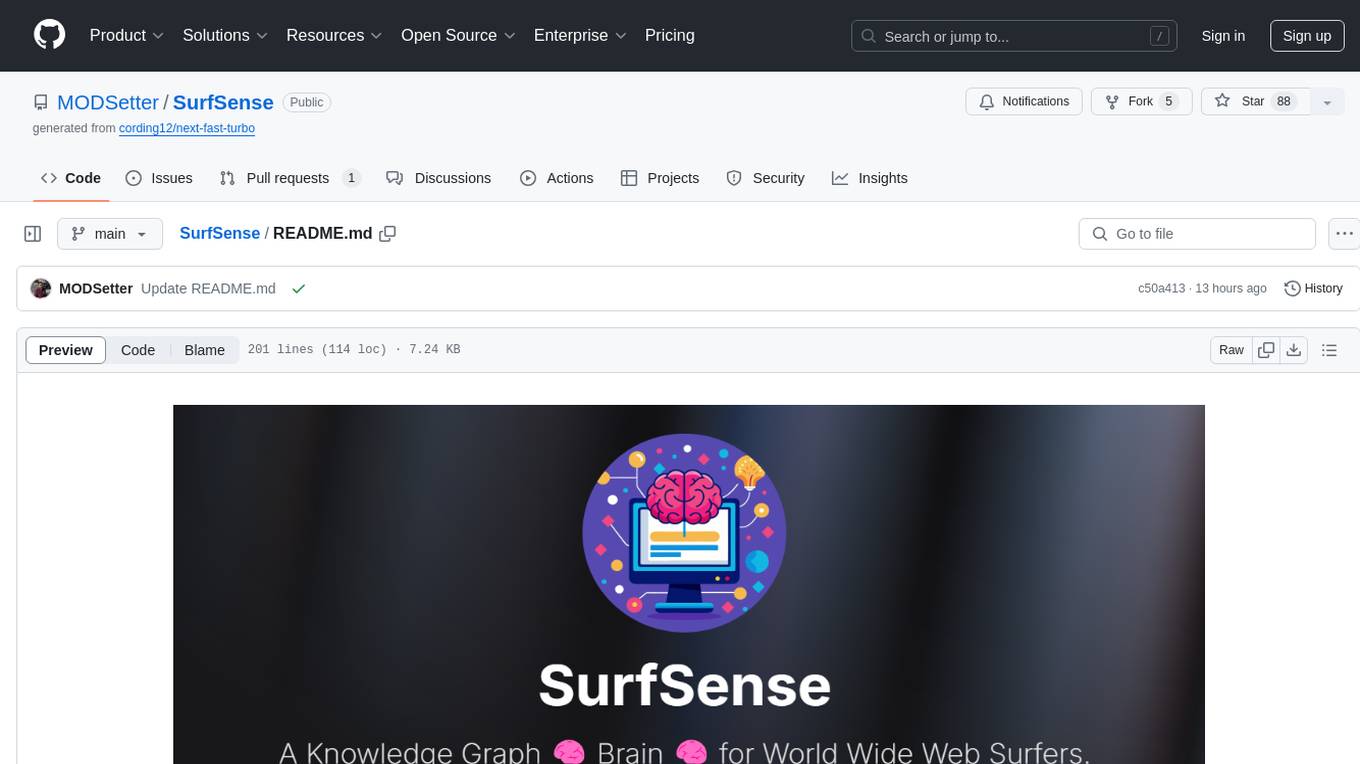
SurfSense
SurfSense is a tool designed to help users save and organize content from the internet into a personal Knowledge Graph. It allows users to capture web browsing sessions and webpage content using a Chrome extension, enabling easy retrieval and recall of saved information. SurfSense offers features like powerful search capabilities, natural language interaction with saved content, self-hosting options, and integration with GraphRAG for meaningful content relations. The tool eliminates the need for web scraping by directly reading data from the DOM, making it a convenient solution for managing online information.
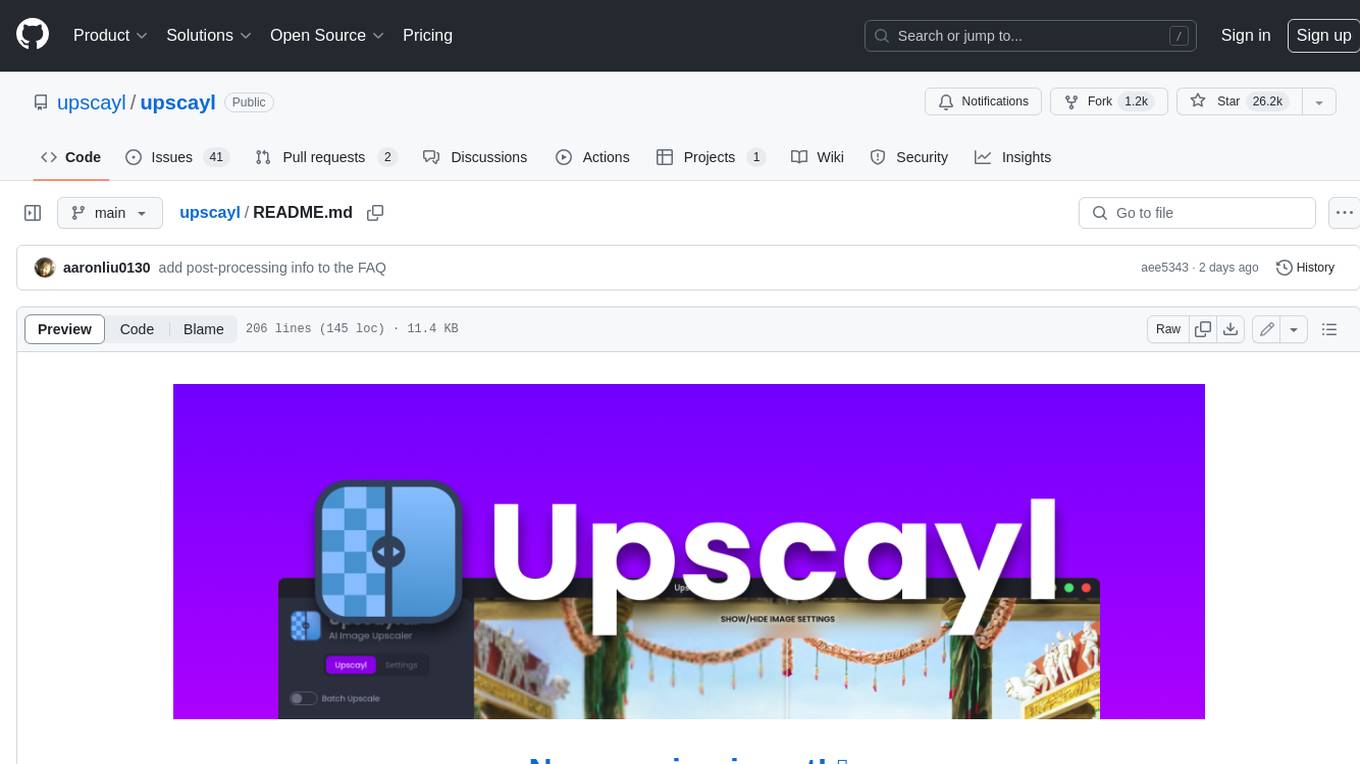
upscayl
Upscayl is a free and open-source AI image upscaler that uses advanced AI algorithms to enlarge and enhance low-resolution images without losing quality. It is a cross-platform application built with the Linux-first philosophy, available on all major desktop operating systems. Upscayl utilizes Real-ESRGAN and Vulkan architecture for image enhancement, and its backend is fully open-source under the AGPLv3 license. It is important to note that a Vulkan compatible GPU is required for Upscayl to function effectively.

Magick
Magick is a groundbreaking visual AIDE (Artificial Intelligence Development Environment) for no-code data pipelines and multimodal agents. Magick can connect to other services and comes with nodes and templates well-suited for intelligent agents, chatbots, complex reasoning systems and realistic characters.
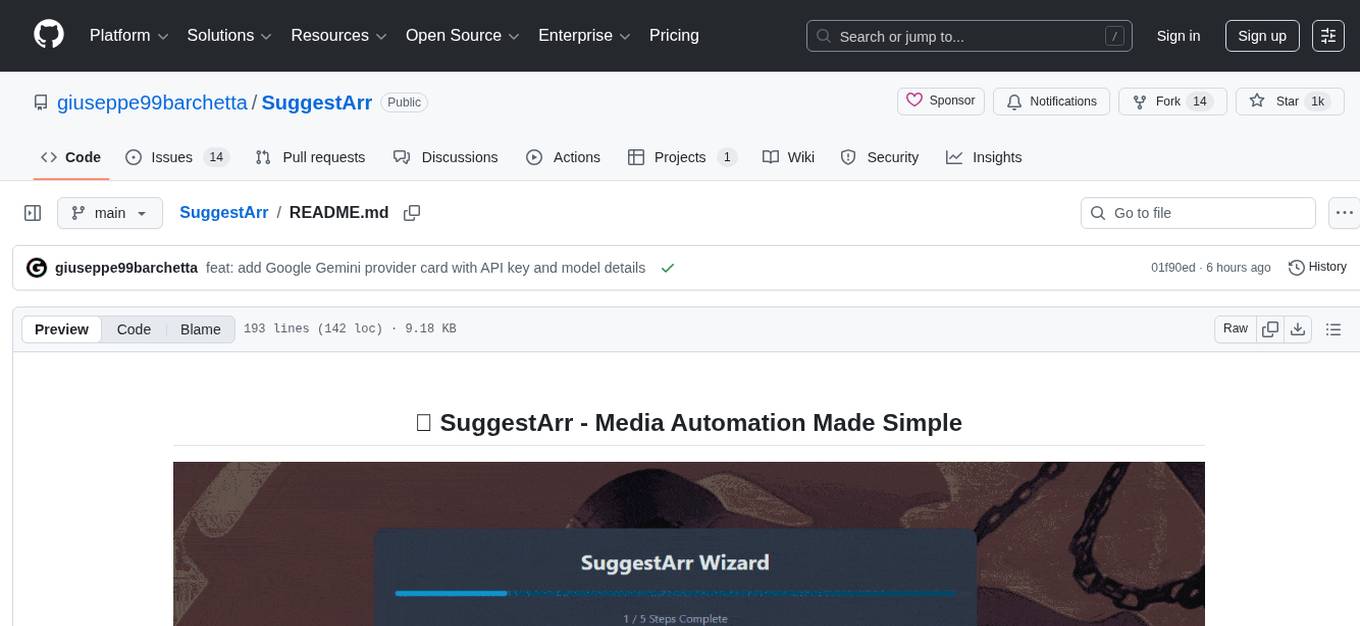
SuggestArr
SuggestArr is a Python library that provides functionality for generating suggestions based on input arrays. It allows users to easily create suggestions for various use cases such as autocomplete, search suggestions, and recommendation systems. The library uses algorithms like Levenshtein distance and cosine similarity to generate accurate and relevant suggestions. SuggestArr is designed to be flexible and customizable, allowing users to fine-tune the suggestion generation process to suit their specific needs.
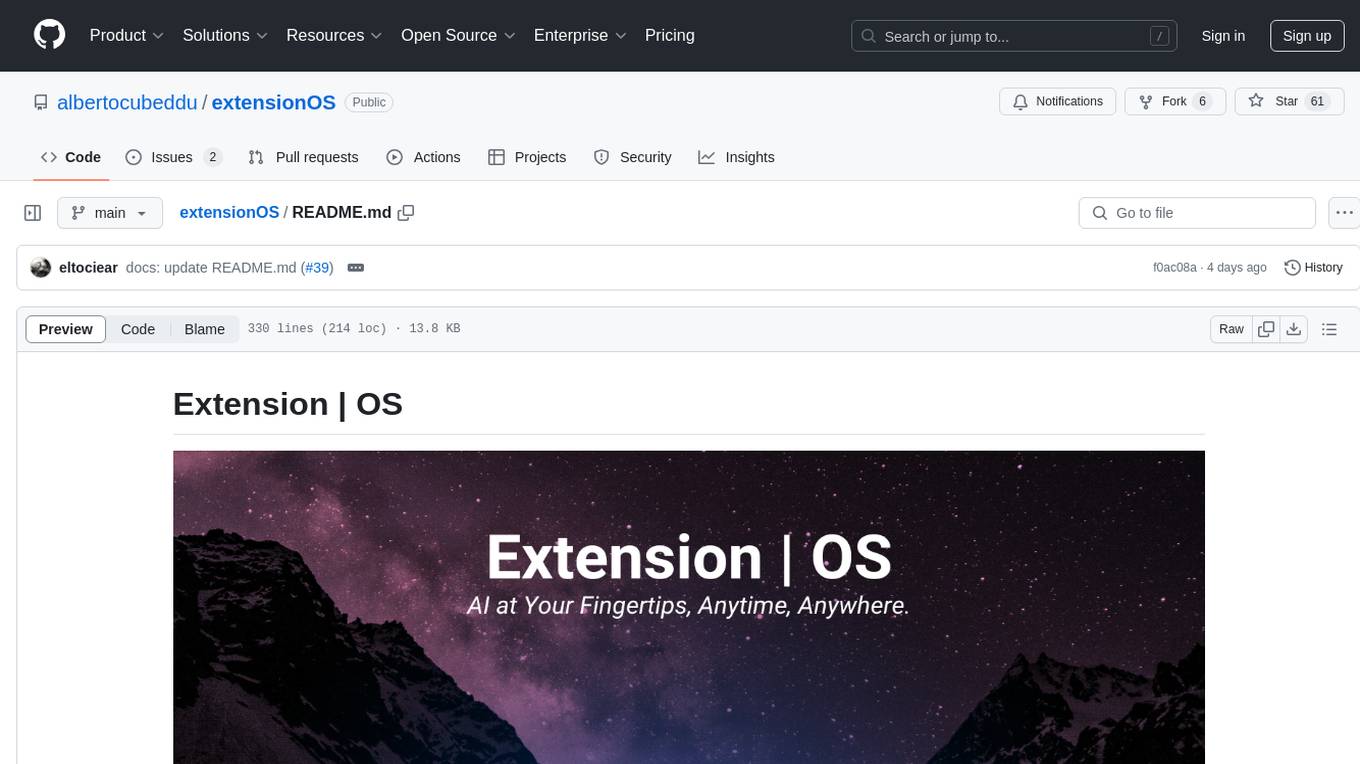
extensionOS
Extension | OS is an open-source browser extension that brings AI directly to users' web browsers, allowing them to access powerful models like LLMs seamlessly. Users can create prompts, fix grammar, and access intelligent assistance without switching tabs. The extension aims to revolutionize online information interaction by integrating AI into everyday browsing experiences. It offers features like Prompt Factory for tailored prompts, seamless LLM model access, secure API key storage, and a Mixture of Agents feature. The extension was developed to empower users to unleash their creativity with custom prompts and enhance their browsing experience with intelligent assistance.
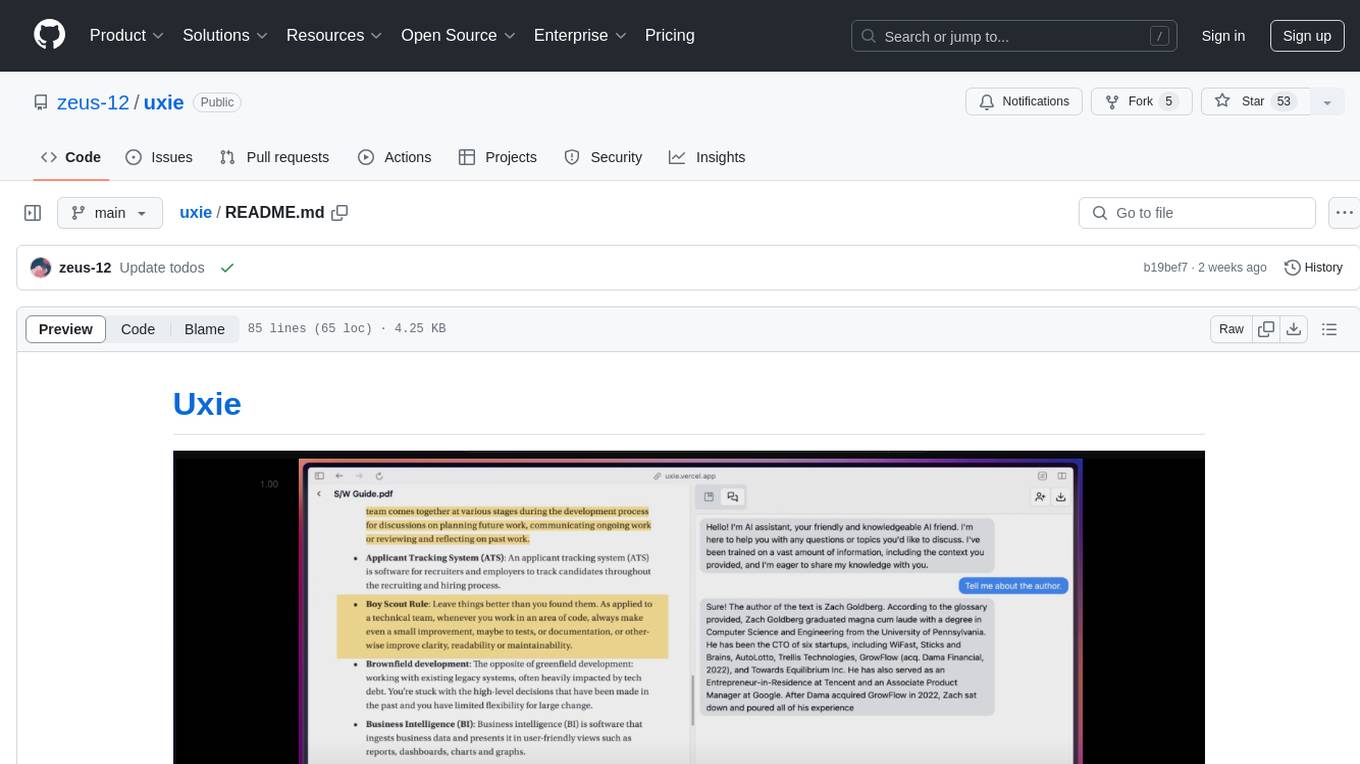
uxie
Uxie is a PDF reader app designed to revolutionize the learning experience. It offers features such as annotation, note-taking, collaboration tools, integration with LLM for enhanced learning, and flashcard generation with LLM feedback. Built using Nextjs, tRPC, Zod, TypeScript, Tailwind CSS, React Query, React Hook Form, Supabase, Prisma, and various other tools. Users can take notes, summarize PDFs, chat and collaborate with others, create custom blocks in the editor, and use AI-powered text autocompletion. The tool allows users to craft simple flashcards, test knowledge, answer questions, and receive instant feedback through AI evaluation.
For similar tasks

ai-driven-dev-community
AI Driven Dev Community is a repository aimed at helping developers become more efficient by utilizing AI tools in their daily coding tasks. It provides a collection of tools, prompts, snippets, and agents for developers to integrate AI into their workflow. The repository is regularly updated with new resources and focuses on best practices for using AI in development work. Users can find tools like Espanso, ChatGPT, GitHub Copilot, and VSCode recommended for enhancing their coding experience. Additionally, the repository offers guidance on customizing AI for developers, installing AI toolbox for software engineers, and contributing to the community through easy steps.
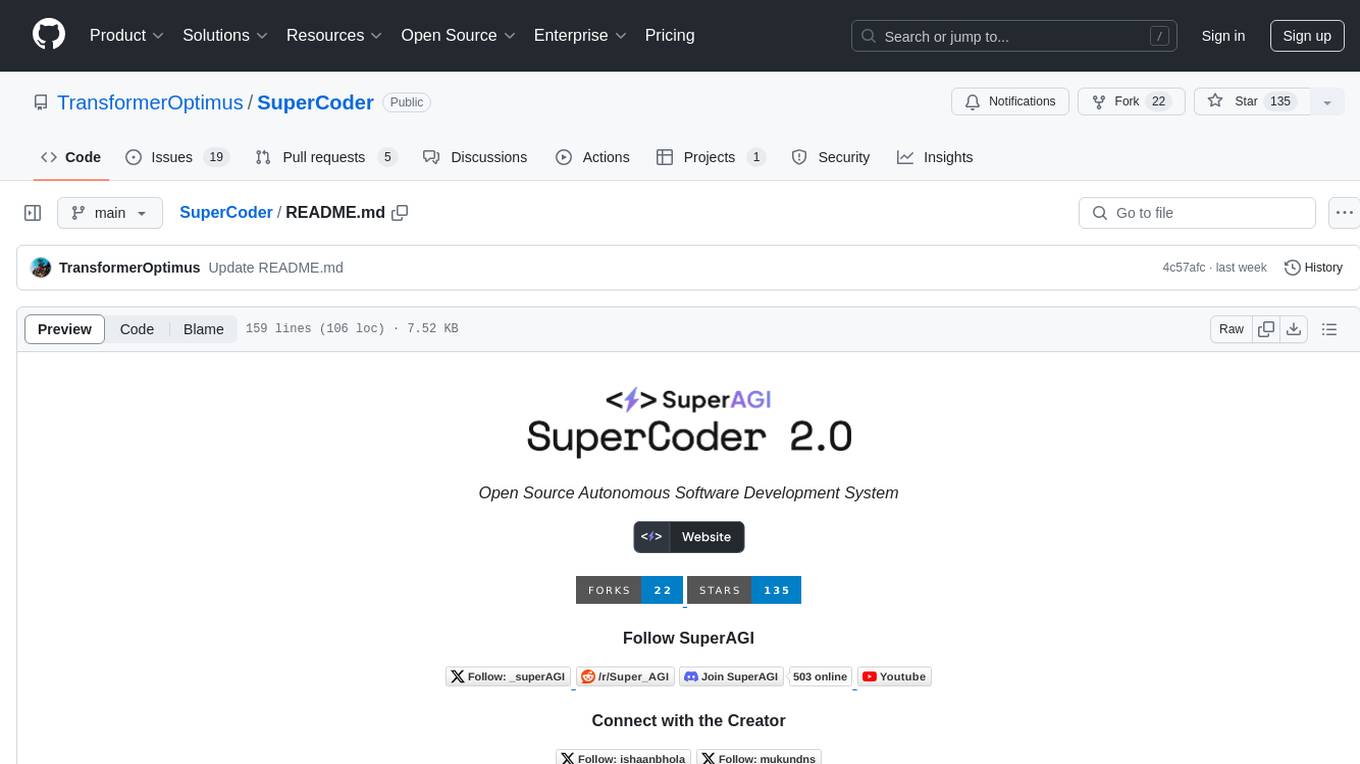
SuperCoder
SuperCoder is an open-source autonomous software development system that leverages advanced AI tools and agents to streamline and automate coding, testing, and deployment tasks, enhancing efficiency and reliability. It supports a variety of languages and frameworks for diverse development needs. Users can set up the environment variables, build and run the Go server, Asynq worker, and Postgres using Docker and Docker Compose. The project is under active development and may still have issues, but users can seek help and support from the Discord community or by creating new issues on GitHub.
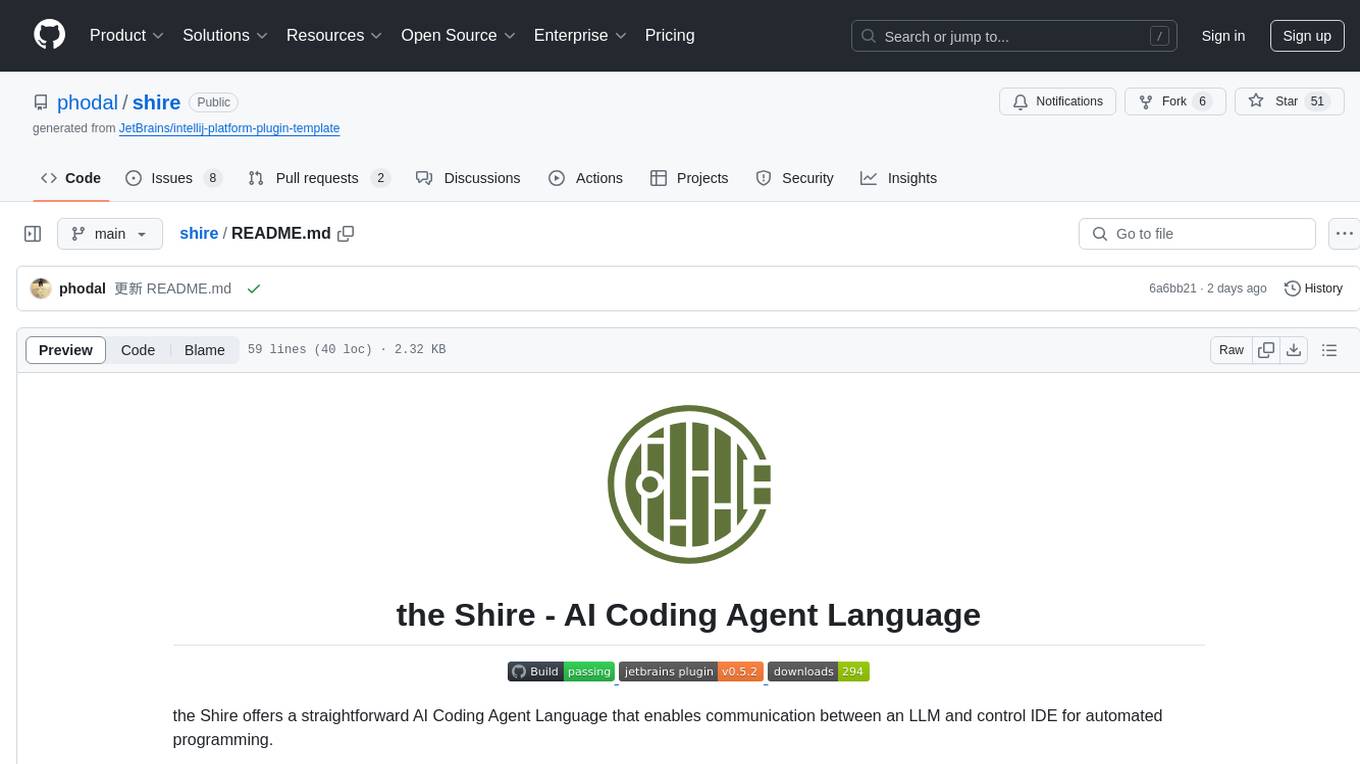
shire
The Shire is an AI Coding Agent Language that facilitates communication between an LLM and control IDE for automated programming. It offers a straightforward approach to creating AI agents tailored to individual IDEs, enabling users to build customized AI-driven development environments. The concept of Shire originated from AutoDev, a subproject of UnitMesh, with DevIns as its precursor. The tool provides documentation and resources for implementing AI in software engineering projects.
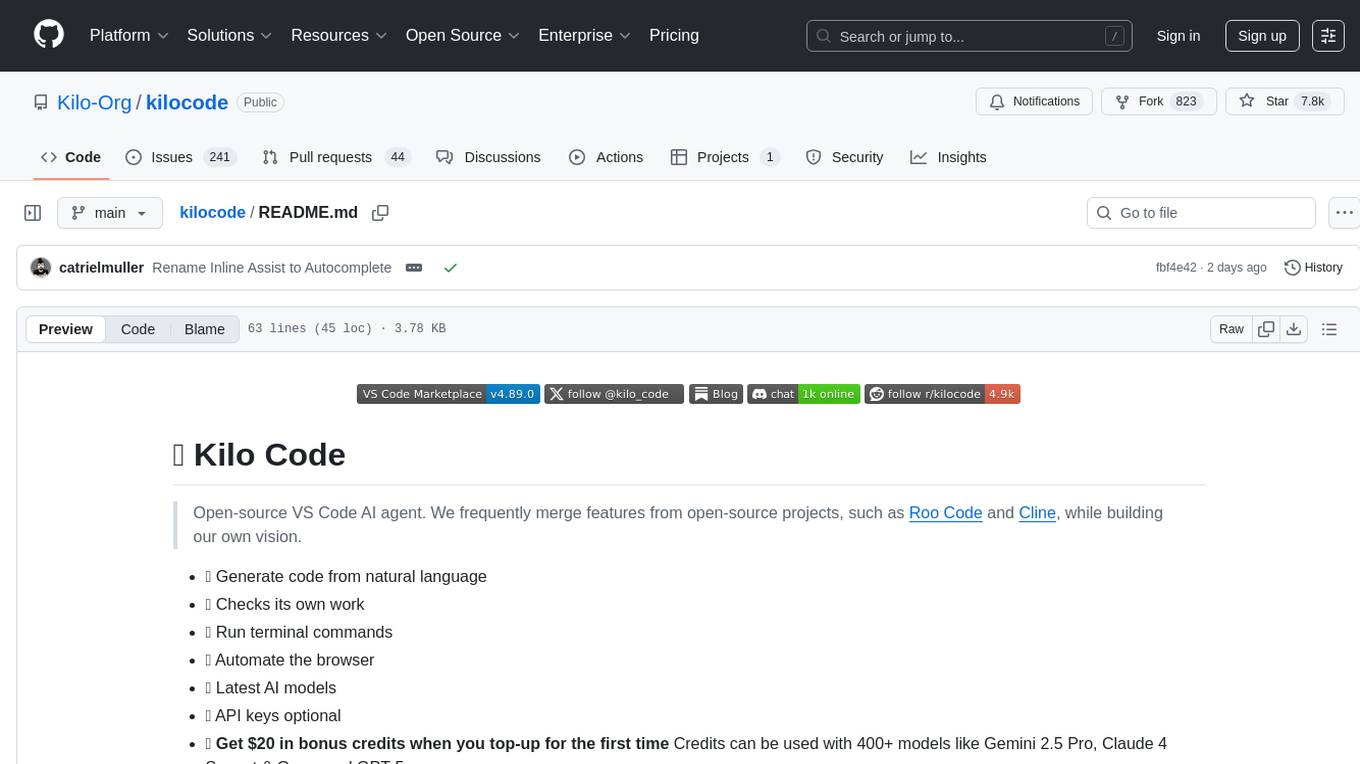
kilocode
Kilo Code is an open-source VS Code AI agent that allows users to generate code from natural language, check its own work, run terminal commands, automate the browser, and utilize the latest AI models. It offers features like task automation, automated refactoring, and integration with MCP servers. Users can access 400+ AI models and benefit from transparent pricing. Kilo Code is a fork of Roo Code and Cline, with improvements and unique features developed independently.
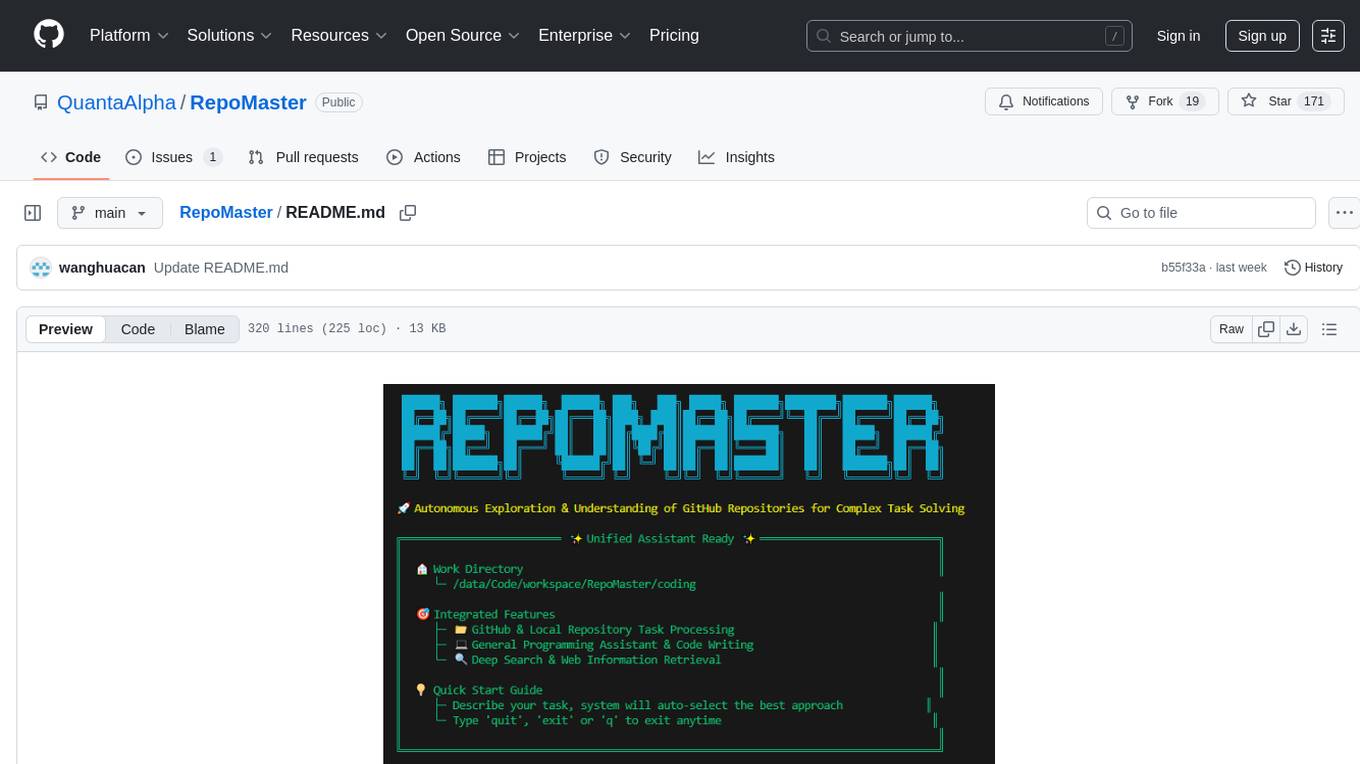
RepoMaster
RepoMaster is an AI agent that leverages GitHub repositories to solve complex real-world tasks. It transforms how coding tasks are solved by automatically finding the right GitHub tools and making them work together seamlessly. Users can describe their tasks, and RepoMaster's AI analysis leads to auto discovery and smart execution, resulting in perfect outcomes. The tool provides a web interface for beginners and a command-line interface for advanced users, along with specialized agents for deep search, general assistance, and repository tasks.
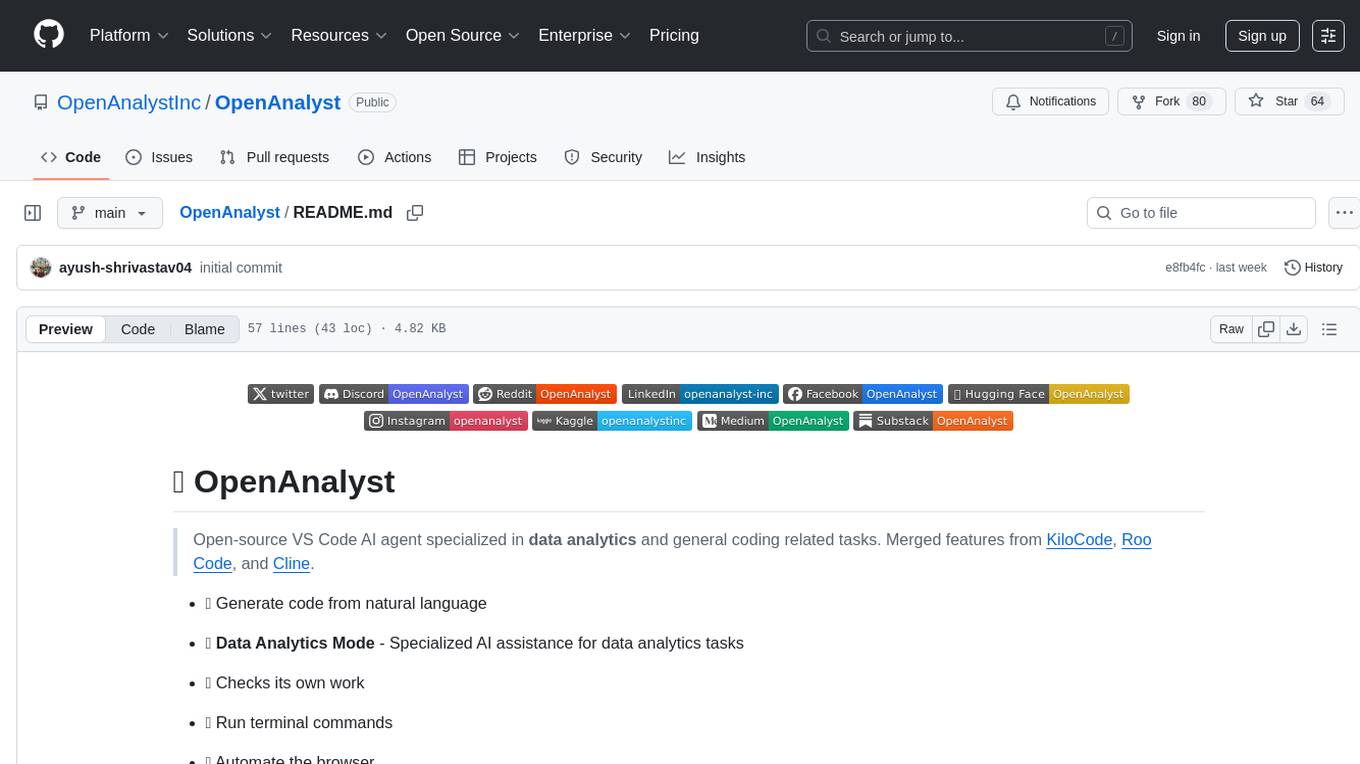
OpenAnalyst
OpenAnalyst is an open-source VS Code AI agent specialized in data analytics and general coding tasks. It merges features from KiloCode, Roo Code, and Cline, offering code generation from natural language, data analytics mode, self-checking, terminal command running, browser automation, latest AI models, and API keys option. It supports multi-mode operation for roles like Data Analyst, Code, Ask, and Debug. OpenAnalyst is a fork of KiloCode, combining the best features from Cline, Roo Code, and KiloCode, with enhancements like MCP Server Marketplace, automated refactoring, and support for latest AI models.
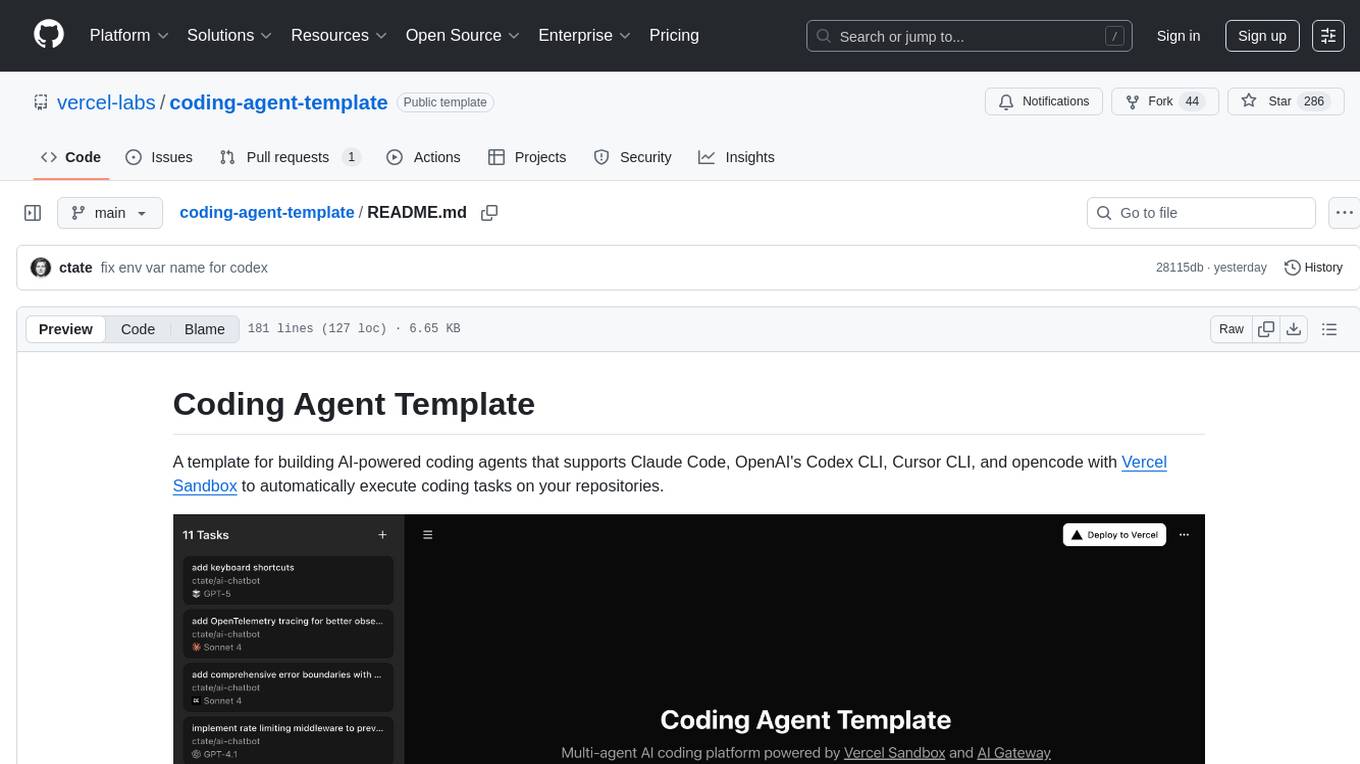
coding-agent-template
Coding Agent Template is a versatile tool for building AI-powered coding agents that support various coding tasks using Claude Code, OpenAI's Codex CLI, Cursor CLI, and opencode with Vercel Sandbox. It offers features like multi-agent support, Vercel Sandbox for secure code execution, AI Gateway integration, AI-generated branch names, task management, persistent storage, Git integration, and a modern UI built with Next.js and Tailwind CSS. Users can easily deploy their own version of the template to Vercel and set up the tool by cloning the repository, installing dependencies, configuring environment variables, setting up the database, and starting the development server. The tool simplifies the process of creating tasks, monitoring progress, reviewing results, and managing tasks, making it ideal for developers looking to automate coding tasks with AI agents.
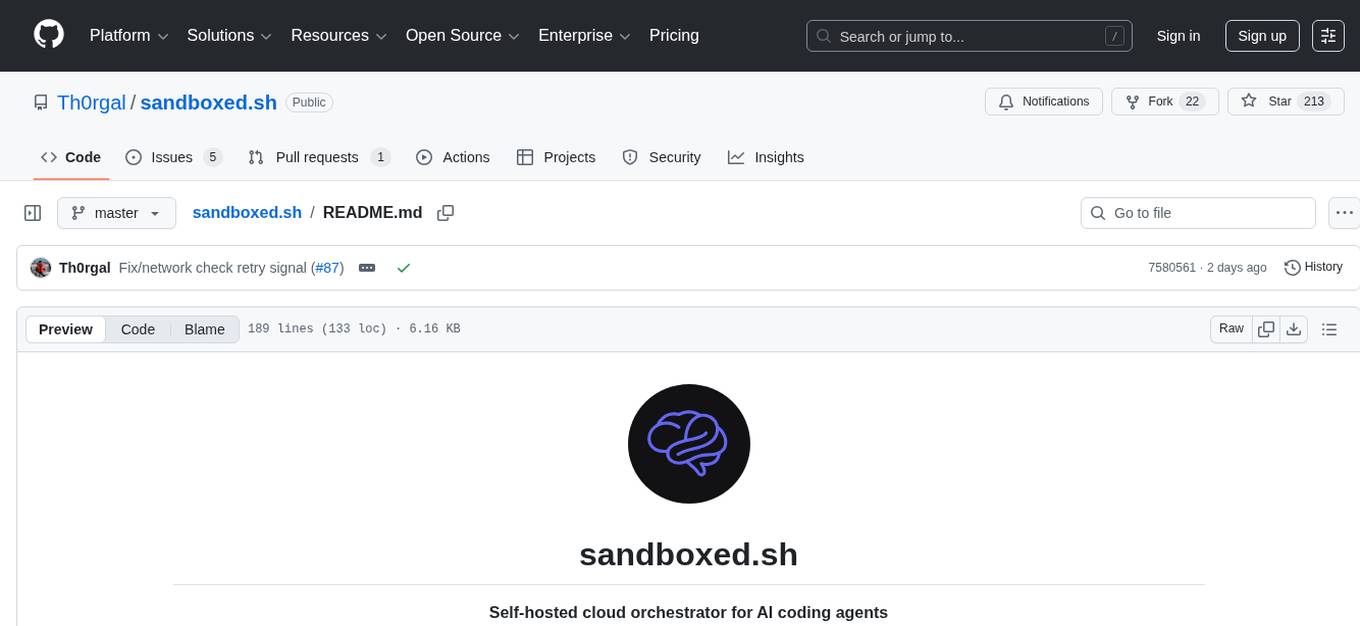
sandboxed.sh
sandboxed.sh is a self-hosted cloud orchestrator for AI coding agents that provides isolated Linux workspaces with Claude Code, OpenCode & Amp runtimes. It allows users to hand off entire development cycles, run multi-day operations unattended, and keep sensitive data local by analyzing data against scientific literature. The tool features dual runtime support, mission control for remote agent management, isolated workspaces, a git-backed library, MCP registry, and multi-platform support with a web dashboard and iOS app.
For similar jobs

promptflow
**Prompt flow** is a suite of development tools designed to streamline the end-to-end development cycle of LLM-based AI applications, from ideation, prototyping, testing, evaluation to production deployment and monitoring. It makes prompt engineering much easier and enables you to build LLM apps with production quality.

deepeval
DeepEval is a simple-to-use, open-source LLM evaluation framework specialized for unit testing LLM outputs. It incorporates various metrics such as G-Eval, hallucination, answer relevancy, RAGAS, etc., and runs locally on your machine for evaluation. It provides a wide range of ready-to-use evaluation metrics, allows for creating custom metrics, integrates with any CI/CD environment, and enables benchmarking LLMs on popular benchmarks. DeepEval is designed for evaluating RAG and fine-tuning applications, helping users optimize hyperparameters, prevent prompt drifting, and transition from OpenAI to hosting their own Llama2 with confidence.

MegaDetector
MegaDetector is an AI model that identifies animals, people, and vehicles in camera trap images (which also makes it useful for eliminating blank images). This model is trained on several million images from a variety of ecosystems. MegaDetector is just one of many tools that aims to make conservation biologists more efficient with AI. If you want to learn about other ways to use AI to accelerate camera trap workflows, check out our of the field, affectionately titled "Everything I know about machine learning and camera traps".

leapfrogai
LeapfrogAI is a self-hosted AI platform designed to be deployed in air-gapped resource-constrained environments. It brings sophisticated AI solutions to these environments by hosting all the necessary components of an AI stack, including vector databases, model backends, API, and UI. LeapfrogAI's API closely matches that of OpenAI, allowing tools built for OpenAI/ChatGPT to function seamlessly with a LeapfrogAI backend. It provides several backends for various use cases, including llama-cpp-python, whisper, text-embeddings, and vllm. LeapfrogAI leverages Chainguard's apko to harden base python images, ensuring the latest supported Python versions are used by the other components of the stack. The LeapfrogAI SDK provides a standard set of protobuffs and python utilities for implementing backends and gRPC. LeapfrogAI offers UI options for common use-cases like chat, summarization, and transcription. It can be deployed and run locally via UDS and Kubernetes, built out using Zarf packages. LeapfrogAI is supported by a community of users and contributors, including Defense Unicorns, Beast Code, Chainguard, Exovera, Hypergiant, Pulze, SOSi, United States Navy, United States Air Force, and United States Space Force.

llava-docker
This Docker image for LLaVA (Large Language and Vision Assistant) provides a convenient way to run LLaVA locally or on RunPod. LLaVA is a powerful AI tool that combines natural language processing and computer vision capabilities. With this Docker image, you can easily access LLaVA's functionalities for various tasks, including image captioning, visual question answering, text summarization, and more. The image comes pre-installed with LLaVA v1.2.0, Torch 2.1.2, xformers 0.0.23.post1, and other necessary dependencies. You can customize the model used by setting the MODEL environment variable. The image also includes a Jupyter Lab environment for interactive development and exploration. Overall, this Docker image offers a comprehensive and user-friendly platform for leveraging LLaVA's capabilities.

carrot
The 'carrot' repository on GitHub provides a list of free and user-friendly ChatGPT mirror sites for easy access. The repository includes sponsored sites offering various GPT models and services. Users can find and share sites, report errors, and access stable and recommended sites for ChatGPT usage. The repository also includes a detailed list of ChatGPT sites, their features, and accessibility options, making it a valuable resource for ChatGPT users seeking free and unlimited GPT services.

TrustLLM
TrustLLM is a comprehensive study of trustworthiness in LLMs, including principles for different dimensions of trustworthiness, established benchmark, evaluation, and analysis of trustworthiness for mainstream LLMs, and discussion of open challenges and future directions. Specifically, we first propose a set of principles for trustworthy LLMs that span eight different dimensions. Based on these principles, we further establish a benchmark across six dimensions including truthfulness, safety, fairness, robustness, privacy, and machine ethics. We then present a study evaluating 16 mainstream LLMs in TrustLLM, consisting of over 30 datasets. The document explains how to use the trustllm python package to help you assess the performance of your LLM in trustworthiness more quickly. For more details about TrustLLM, please refer to project website.

AI-YinMei
AI-YinMei is an AI virtual anchor Vtuber development tool (N card version). It supports fastgpt knowledge base chat dialogue, a complete set of solutions for LLM large language models: [fastgpt] + [one-api] + [Xinference], supports docking bilibili live broadcast barrage reply and entering live broadcast welcome speech, supports Microsoft edge-tts speech synthesis, supports Bert-VITS2 speech synthesis, supports GPT-SoVITS speech synthesis, supports expression control Vtuber Studio, supports painting stable-diffusion-webui output OBS live broadcast room, supports painting picture pornography public-NSFW-y-distinguish, supports search and image search service duckduckgo (requires magic Internet access), supports image search service Baidu image search (no magic Internet access), supports AI reply chat box [html plug-in], supports AI singing Auto-Convert-Music, supports playlist [html plug-in], supports dancing function, supports expression video playback, supports head touching action, supports gift smashing action, supports singing automatic start dancing function, chat and singing automatic cycle swing action, supports multi scene switching, background music switching, day and night automatic switching scene, supports open singing and painting, let AI automatically judge the content.












